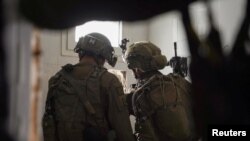Agence France-Presse said that one of its journalists has reported continuous shelling in Khan Younis and Rafah. Located near Egypt, Rafah is where thousands of Palestinians have sought refuge from the fighting.
In central Gaza, Israel has hit the Nuseirat camp with air strikes.
Israel’s military said two Hamas compounds were dismantled in Beit Lahia in northern Gaza.
The reports of the numerous assaults on Gaza come after Gazan health officials say nearly 200 people have been killed in a 24-hour period.
United Nations officials have decried what they say is the recent targeting of a Gaza aid convoy by Israeli forces.
Thomas White, director of UNRWA, the U.N. agency for Palestinian refugees, said on X, formerly Twitter, Friday that "Israeli soldiers fired at an aid convoy as it returned from Northern Gaza along a route designated by the Israeli Army."
Martin Griffiths, the U.N. undersecretary-general for humanitarian affairs and emergency relief coordinator, said Friday that a humanitarian aid convoy was "fired upon while traveling from northern Gaza to Rafah" in vehicles that were "clearly marked."
"The conflict must stop," Griffiths said.
Attacks on humanitarian workers are "unlawful," he said.
No one was hurt in the incident. One vehicle was damaged. The Israeli military had no immediate comment.
600,000 vaccines delivered
UNICEF delivered at least 600,000 vaccines to Gaza on Friday. Nearly 17,000 children in Gaza have missed their routine vaccinations, including polio and measles, since the start of the fighting between Israel and Hamas in October, according to the agency.
UNICEF said it is working with the World Health Organization and UNRWA to reach the children who have missed their shots.
Israel’s widening attacks in central and southern Gaza have pushed tens of thousands of Palestinians seeking shelter into Rafah, where the population has more than tripled to 850,000, according to U.N. figures.
"People are using any empty space to build shacks," said UNRWA spokesperson Juliette Touma. "Some are sleeping in their cars, and others are sleeping in the open."
Most available water is polluted. The sanitation system has broken down, and working toilets are a rarity.
Almost the entire population of Gaza is dependent on international aid, including food, UNRWA head Philippe Lazzarini said Friday. Despite a U.N. resolution last week calling for an immediate and unhindered increase in the entry of aid, no increase has been seen, he said.
Lazzarini said the aid operation faces "severe restrictions" from Israeli authorities. Trucks face long delays at the Rafah crossing on the border with Egypt and the newly reopened Kerem Shalom crossing from Israel, he said.
Aid distribution within Gaza is further obstructed by the constant bombardment and fighting, Israeli military checkpoints and repeated cuts in telecommunications, he said, as well as by desperate crowds that often overwhelm arriving aid trucks and take supplies.
Israel has told residents of central Gaza to head south, but even there, people are not safe.
A strike in Rafah on Thursday evening destroyed a residential building, killing at least 23 people, according to the media office of the nearby Kuwaiti Hospital.
Twelve weeks after Hamas militants stormed into southern Israel, killing about 1,200 people and seizing 240 hostages, Israeli forces have flattened much of the Gaza enclave. Nearly all its 2.3 million people have been displaced.
Hamas has been designated a terrorist organization by the United States, United Kingdom, European Union and others.
Gaza’s Hamas-run health ministry said Friday the Palestinian death toll since October has reached 21,507, about 1% of Gaza's population. Thousands more bodies are feared buried in the ruins of Gaza’s obliterated neighborhoods, while nearly 56,000 civilians have been wounded by Israeli attacks since October.
The Israeli military says 167 of its troops have been killed.
This article originates from VOA News. Some material for this report came from The Associated Press, Agence France-Presse and Reuters.










